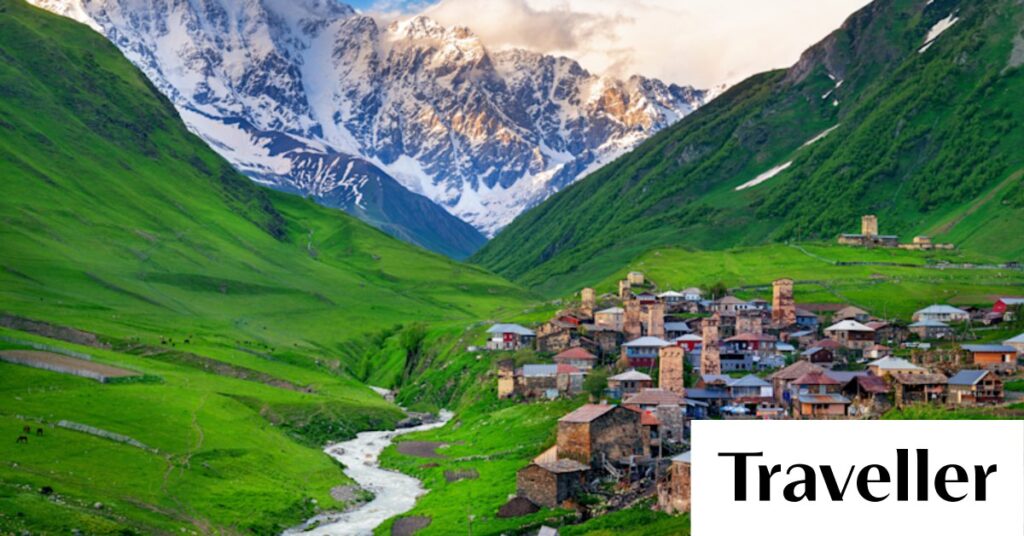
After navigating an armed border control point near a mountain pass leading to Russia, hikers are rewarded with a breathtaking view of the Ushba glacier. This minty white ice flow cascades down the mountain’s western flank, marking the start of a journey into the heart of the Greater Caucasus. This 1200-kilometre-long mountain range, stretching from the Black Sea to the Caspian Sea, is now more accessible thanks to a newly established hiking trail.
The 12-kilometre round trip to the Shdugra waterfall serves as an ideal warm-up for adventurers planning to delve deeper into this scenically extravagant region. Mestia, a cosmopolitan ski town, acts as the gateway to this natural wonderland. With its blend of modern hotels and ancient stone towers, Mestia offers a unique cultural experience.
Exploring the Greater Caucasus
From Mestia, hikers embark on a three-day trek to Ushguli, navigating through a landscape of forested ravines and glacial rivers. The journey involves challenging climbs over mountain passes, with the highest reaching 2720 metres. However, the effort is rewarded with panoramic views of glaciers and peaks, making for unforgettable lunch spots.
Afternoons are spent descending trails through beech forests, where hikers may encounter fields of cattle and wild horses. Along the way, they meet fellow adventurers from around the world, each bringing their own stories and experiences to the trail.
A Taste of Local Culture
Accommodation in the region is rustic yet welcoming, with small guesthouses offering basic rooms and shared facilities. Meals are a highlight, starting with generous breakfasts of homemade bread, cheese, and salads, and ending with hearty dinners featuring local soups and curries.
Georgia’s claim as the world’s oldest wine-making culture is evident in its traditional amber wines, produced in clay pots called qvevri. Although these wines can be challenging, they are part of the cultural experience, often accompanied by chacha, a potent digestif.
Historical and Cultural Insights
Hikers can learn about Georgia’s rich history at places like Merebashvili’s Marani, a family-run winery in Kaspi. Here, owner Lasha Merebashvili shares stories of Georgia’s grape varietals, many of which were lost to “phylloxera and communism.”
The legacy of Russia is visible throughout Georgia, from Soviet-era bas-reliefs in Tbilisi to Cyrillic gravestones. The EU-built settlements housing Georgian refugees displaced by Russian incursions in 2008 serve as reminders of the country’s turbulent past.
Preserving Heritage
Despite its Soviet history, Georgia has preserved significant cultural sites, such as the 6th-century Jvari Monastery and the 11th-century Svetitskhoveli Cathedral, both UNESCO World Heritage sites. These sites, along with the ancient cave dwellings of Uplistsikhe, offer a glimpse into Georgia’s past.
In Gori, the birthplace of Stalin, visitors can explore a museum dedicated to the controversial leader. Guide Lasha Udzilauri reflects on the pride some older Georgians feel for Stalin, contrasting it with the younger generation’s desire for change.
Georgia’s Evolving Identity
Since gaining independence from the Soviet Union in 1991, Georgia has undergone significant economic, social, and cultural transformations. This evolution is evident in Tbilisi’s mix of contemporary architecture and Soviet-era buildings, as well as in the revitalization of remote regions like Upper Svaneti.
On a visit to Mestia, the juxtaposition of modern amenities and traditional life is striking. A late-night stroll reveals stylish cafes and co-working spaces alongside scenes reminiscent of Georgia’s past, such as a boy herding cattle down the main street.
Travel Information
For those interested in experiencing Georgia’s natural and cultural offerings, airlines such as Emirates and Qatar Airways provide convenient routes to Tbilisi via Dubai and Doha.
For more information, visit emirates.com and qatarairways.com.







